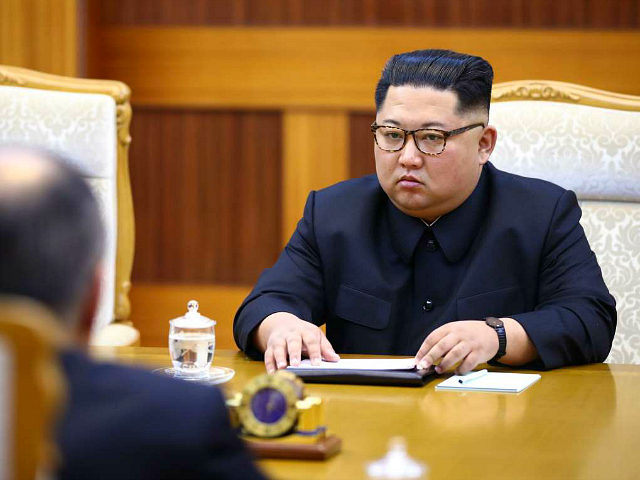North Korean dictator Kim Jong-un admitted the country was enduring a “tense situation” in light of ongoing sanctions and a failure to make a deal with American President Donald Trump in their meeting last month.
He told senior Workers’ Party leaders Wednesday they must exhibit “fortitude” in light of the state of affairs.
“Making a deep analysis of the matters pending urgent solution in the party and state, the Supreme Leader urged the need for leading officials to fully display a high sense of responsibility and creativity,” North Korea’s Foreign Affairs Ministry said in a press release published Wednesday, highlighting that Kim was addressing the Political Bureau of the Central Committee of the Workers’ Party of Korea (WPK), those responsible for implementing the nation’s communist ideology. Kim reportedly urged the communist leader to also mantain “the revolutionary spirit of self-reliance and fortitude in an attitude befitting the masters of the revolution and construction under the prevailing tense situation and thus follow through on the new strategic line of the Party.”
Kim also suggested Party leaders strive to remove “formalism, expediency, subjectivism, self-protectionism, defeatism, party authority and bureaucratism chronic among leading officials and all sorts of other undesirable practices” from their daily routines.
The meeting occurred shortly before Thursday’s scheduled parliamentary meeting, considered a high-profile affair for Kim in which he is expected to deliver a significant policy address. His tone in addressing a smaller group of senior party leaders suggests he will deliver a less-than-optimistic address to the parliament, some observers have suggested. The South Korean news outlet Yonhap predicted that Kim is “unlikely to announce any major policy shift” with the United States and cites experts interpreting the speech as Kim looking to impose his authority in the aftermath of the failed Trump meeting, particularly to diplomats present at the meeting who played major roles in brokering the summit.
“Kim’s remarks during the politburo meeting appear to be making it clear again that he wants to tighten up internal discipline to achieve the new strategic line,” Lim Eul-chul, a professor at the Institute for Far East Studies at Kyungnam University, told Yonhap.
“Chairman Kim and myself, we want to do the right deal. Speed is not important. What’s important is that we do the right deal,” Trump initially said, before stating that he left because Kim demanded the United States lift sanctions on his regime, something Trump was not ready to do.
“It was about the sanctions … basically, they wanted the sanctions lifted in their entirety, and we couldn’t do that,” Trump said before returning to the United States. “He wants to de-nuke, but he wants to do some areas that aren’t what we want.”
Trump and other administration officials have insisted that America will neither lift sanctions nor promote the lifting of United Nations sanctions on North Korea until the country ends its illegal nuclear weapons program permanently. Some sanctions are also a response to brutal human rights abuses in the country, considered the world’s most repressive.
The sanctions have significantly damaged the Kim regime’s ability to invest in military and tourism projects, both among Kim’s key ambitions. This week, the South Korean newspaper Chosun Ilbo reported that the regime was forced to halt construction on a series of projects in Wonsan, a coastal town Kim Jong-un has attempted to turn into a beachside resort. According to Chosun, the Kim regime has admitted to workers being forced to use their “bare hands” to build tourist facilities because they do not have the money for tools, blaming the sanctions for the delay. Kim delayed completion of the project, meant to open this October, far into 2020.
Tourism is one of the few industries not under international sanctions and, thanks in part to President Trump’s favorable words for Kim, has seen some improvement. On Sunday, nearly twice as many Westerners visited Pyongyang for its annual marathon than did so in 2018, according to the Koryo Tours agency. China, which sends the highest number of foreign tourists into North Korea, also inaugurated a new bridge into the country this week with buses bringing 120 Chinese tourists into the country.

COMMENTS
Please let us know if you're having issues with commenting.